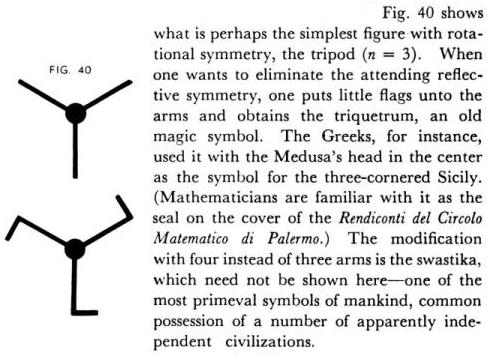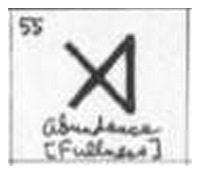Santa Fe Institute logo (see previous post) —


Today's previous post on coordinate systems
suggests a look at the phrase "Galois coordinates."
A search shows that the phrase, though natural,
has apparently not been used before 2011* for solutions
to what Hermann Weyl called "the relativity problem."
A thorough historical essay on Galois coordinatization
in this sense would require more academic resources
than I have available. It would likely describe a number
of applications of Galois-field coordinates to square
(and perhaps to cubical) arrays that were studied before
1976, the date of my Diamond Theory monograph.
But such a survey might not find any such pre-1976
coordinatization of a 4×4 array by the 16 elements
of the vector 4-space over the Galois field with two
elements, GF(2).
Such coordinatizations are important because of their
close relationship to the Mathieu group M 24 .
See a preprint by Anne Taormina and Katrin Wendland,
"The overarching finite symmetry group of Kummer
surfaces in the Mathieu group M 24 ," with its remark
denying knowledge of any such coordinatization
prior to a 1989 paper by R. T. Curtis.
Related material:
Some images related to Galois coordinates, excerpted
from a Google search today (click to enlarge)—
* A rather abstract 2011 paper that uses the phrase
"Galois coordinates" may have some implications
for the naive form of the relativity problem
related to square and cubical arrays.
Found this morning in a search:
A logline is a one-sentence summary of your script.
www.scriptologist.com/Magazine/Tips/Logline/logline.html
It's the short blurb in TV guides that tells you what a movie
is about and helps you decide if you're interested …
The search was suggested by a screenwriting weblog post,
"Loglines: WHAT are you doing?".
What is your story about?
No, seriously, WHAT are you writing about?
Who are the characters? What happens to them?
Where does it take place? What’s the theme?
What’s the style? There are nearly a million
little questions to answer when you set out
to tell a story. But it all starts with one
super, overarching question.
What are you writing about? This is the first
big idea that we pull out of the ether, sometimes
before we even have any characters.
What is your story about?
The screenwriting post was found in an earlier search for
the highlighted phrase.
The screenwriting post was dated December 15, 2009.
What I am doing now is checking for synchronicity.
This weblog on December 15, 2009, had a post
titled A Christmas Carol. That post referred to my 1976
monograph titled Diamond Theory .
I guess the script I'm summarizing right now is about
the heart of that theory, a group of 322,560 permutations
that preserve the symmetry of a family of graphic designs.
For that group in action, see the Diamond 16 Puzzle.
The "super overarching" phrase was used to describe
this same group in a different context:
This is from "Mathieu Moonshine," a webpage by Anne Taormina.
A logline summarizing my approach to that group:
Finite projective geometry explains
the surprising symmetry properties
of some simple graphic designs—
found, for instance, in quilts.
The story thus summarized is perhaps not destined for movie greatness.
“Fact and fiction weave in and out of novels like a shell game.” —R.B. Kitaj
Not just novels.
Fact:
The mark preceding A8 in the above denotes the semidirect product.
 |
Symbol from the box-style I Ching (Cullinane, 1/6/89). This is Hexagram 55, “Abundance [Fullness].” |
The mathematical quote, from last evening’s Symmetry, is from Anne Taormina.
The I Ching remark is not.
Another version of Abbondanza —
Fiction:
Found in Translation and the giorno June 22, 2009, here.
Anne Taormina on Mathieu Moonshine —
This is, of course, the same group (of order 322,560) underlying the Diamond 16 Puzzle.
Powered by WordPress